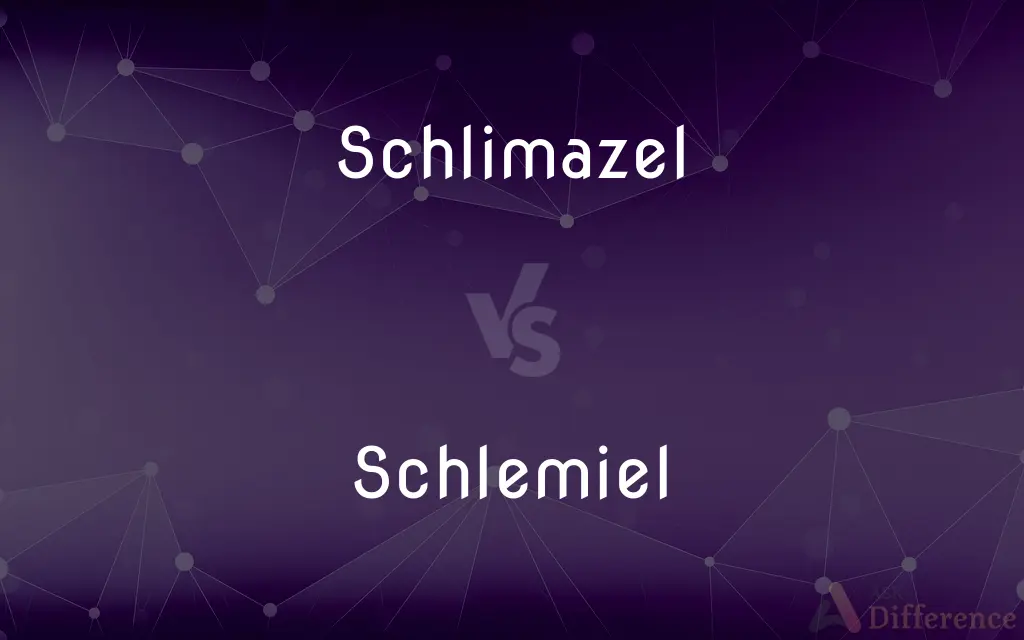Schlimazel vs. Schlemiel — What's the Difference?
Edited by Tayyaba Rehman — By Maham Liaqat — Updated on April 8, 2024
A schlimazel is someone who frequently experiences bad luck, while a schlemiel is often the cause of accidents or mishaps, clumsily creating trouble.

Difference Between Schlimazel and Schlemiel
Table of Contents
ADVERTISEMENT
Key Differences
Schlimazels find themselves on the receiving end of unfortunate circumstances without any fault of their own. They are the ones to whom things happen, often through no action of their own. On the other hand, schlemiels are the perpetrators of bad luck, usually through their own clumsiness or ineptitude, inadvertently causing trouble for themselves and others.
While a schlimazel might walk under a ladder and have a bucket of paint fall on them, a schlemiel would be the one to accidentally knock over the bucket. This illustrates the passive nature of the schlimazel's bad luck versus the active, often accidental, cause of misfortune by the schlemiel.
The concept of the schlimazel and the schlemiel comes from Yiddish culture, where these terms encapsulate a rich tradition of humor and storytelling, often highlighting the human condition's comedic and tragic aspects. These characters are relatable, embodying the spectrum of luck and misfortune that colors human experience.
In dealing with others, a schlimazel might be someone you sympathize with due to their string of bad luck, while a schlemiel might be approached with caution, given their tendency to cause accidents. Despite this, both terms carry a certain affection and humor in Yiddish discourse, recognizing the inherent unpredictability and shared misfortunes in life.
The difference between a schlimazel and a schlemiel can also serve as a reminder of the various roles individuals play in the dynamics of luck and misfortune. Recognizing the schlimazel in a situation calls for empathy, while identifying a schlemiel might require a more proactive approach to mitigate potential mishaps.
ADVERTISEMENT
Comparison Chart
Definition
A person who suffers from chronic bad luck.
A clumsy person who often causes accidents.
Nature of Luck
Passive recipient of bad luck.
Actively causes mishaps, albeit unintentionally.
Origin
Yiddish culture
Yiddish culture
Role in Mishaps
Victim
Perpetrator
Example Scenario
Being hit by a stray ball.
Accidentally throwing the ball that hits someone.
Compare with Definitions
Schlimazel
Bad luck seems to follow them, often through no fault of their own.
As a schlimazel, Helen always finds herself in the wrong place at the wrong time.
Schlemiel
Embodied in stories as the lovable but clumsy character who means well.
The schlemiel in the story accidentally ruined the surprise party by arriving too early.
Schlimazel
A person who consistently experiences bad luck.
Every time Jerry buys an ice cream, it ends up falling to the ground, making him a true schlimazel.
Schlemiel
A person known for their clumsiness, often causing accidents.
Larry is such a schlemiel; he spilled coffee on the bride at the wedding.
Schlimazel
Seen with sympathy due to their continual bad luck.
Everyone feels bad for the schlimazel who missed the bus again despite being early.
Schlemiel
Often approached with caution, but also with a sense of humor.
The schlemiel is invited to parties but is kept away from the china cabinet.
Schlimazel
Needs to navigate life's challenges with resilience.
Despite being a schlimazel, he keeps a positive attitude, hoping his luck will change.
Schlemiel
Their mishaps usually result from their own actions.
As a schlemiel, she often finds herself apologizing for accidents she caused.
Schlimazel
Often featured in Yiddish humor as the unlucky character in stories.
In many Yiddish tales, the schlimazel is the one who, despite his best efforts, ends up empty-handed.
Schlemiel
Works on being more mindful to avoid causing trouble.
Knowing he's a bit of a schlemiel, Tom takes extra care when handling fragile items.
Schlimazel
An extremely unlucky or inept person; a habitual failure.
Schlemiel
Schlemiel (Yiddish: שלומיאל; sometimes spelled shlemiel or shlumiel) is a Yiddish term meaning "incompetent person" or "fool". It is a common archetype in Jewish humor, and so-called "schlemiel jokes" depict the schlemiel falling into unfortunate situations.
Schlimazel
A chronically unlucky person.
Schlemiel
A habitual bungler; a dolt.
Schlimazel
(Yiddish) a very unlucky or inept person who fails at everything
Schlemiel
A loser or a fool.
Schlemiel
A person who is clumsy or who hurts others emotionally.
Schlemiel
(Yiddish) a dolt who is a habitual bungler
Common Curiosities
Can a person be both a schlimazel and a schlemiel?
While they represent different aspects of misfortune, someone might exhibit traits of both in different situations.
What's the main difference between a schlimazel and a schlemiel?
The schlimazel experiences bad luck, while the schlemiel causes accidents.
Are these terms derogatory?
In Yiddish culture, these terms are often used affectionately or humorously to describe someone's luck or behavior.
How should you interact with a schlimazel?
With empathy and understanding, recognizing their misfortune often isn't their fault.
Can a schlemiel change their clumsy nature?
With awareness and effort, a schlemiel can work on being more cautious to reduce accidents.
Do these terms have counterparts in other cultures?
Many cultures have their own versions of characters or terms that embody luck and clumsiness.
What lesson can be learned from understanding these concepts?
They highlight the human aspects of luck, misfortune, and the importance of empathy and understanding in social interactions.
What's the best way to deal with a schlemiel?
With patience and a sense of humor, while also taking precautions to minimize potential mishaps.
Is there a way for a schlimazel to improve their luck?
While luck is unpredictable, maintaining a positive outlook and resilience can help one navigate through misfortunes.
Are schlimazels and schlemiels always portrayed negatively?
Not necessarily; they are often depicted with a blend of sympathy, affection, and humor in storytelling.
Share Your Discovery

Previous Comparison
Pseudocode vs. Code
Next Comparison
Haha vs. HahahaAuthor Spotlight
Written by
Maham LiaqatEdited by
Tayyaba RehmanTayyaba Rehman is a distinguished writer, currently serving as a primary contributor to askdifference.com. As a researcher in semantics and etymology, Tayyaba's passion for the complexity of languages and their distinctions has found a perfect home on the platform. Tayyaba delves into the intricacies of language, distinguishing between commonly confused words and phrases, thereby providing clarity for readers worldwide.
















































